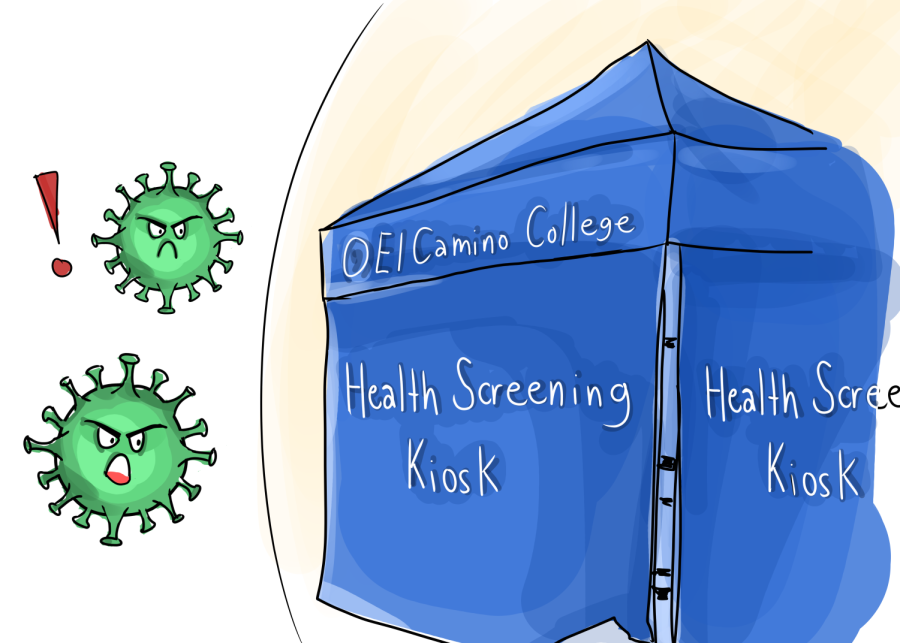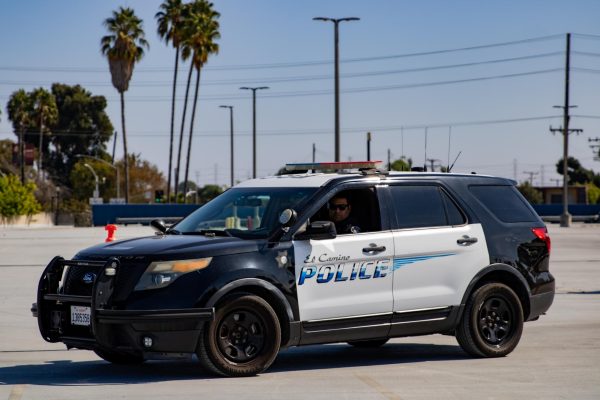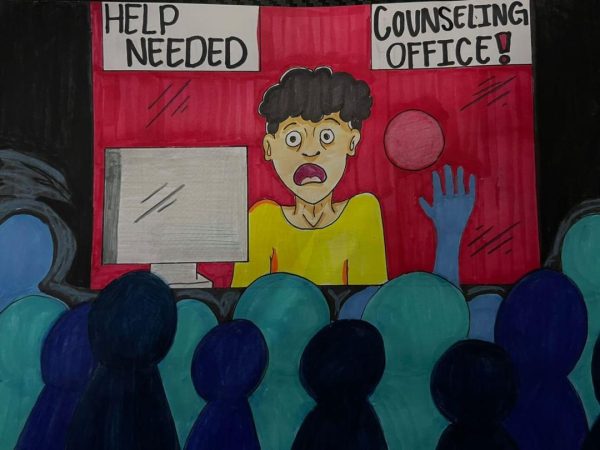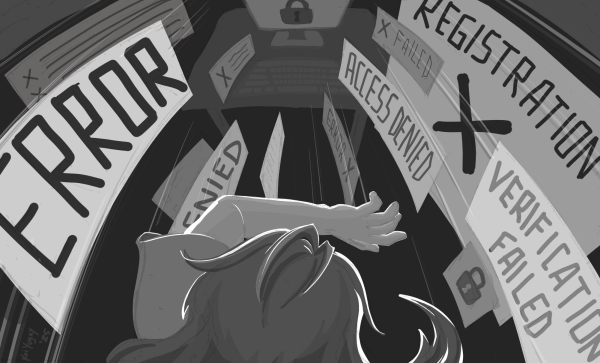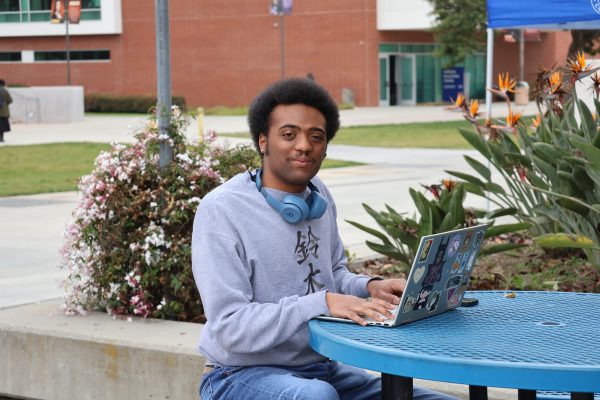Campus re-entry process is good, but needs to be better
The El Camino College campus reopened on July 19 and implemented a campus re-entry process which the Editorial Board believes is a step in the right direction for COVID-19 safety precautions, but it still has room for improvement as the college aims for a safe return to in-person class sessions for 2022.
The campus re-entry screening process required for everyone entering the school grounds is handled by El Camino College (ECC) and World Back To Work (WBTW), a company that oversees the COVID-19 screening services, and keeps the campus and its visitors safe during ECC’s reopening phases.
After the July 19 reopening, there have only been 23 confirmed COVID cases reported on campus compared to the 43 cases that had been reported before the campus reopening. The frequency of confirmed COVID-19 case reports continue to decrease week after week.
Now that a vaccine mandate has been adopted, all signs for the spring 2022 semester seem to point towards a full return to on campus learning and operations for ECC students and faculty. However, there is still room for improvement in areas such as placing additional health screening kiosks, keeping smaller pool testing sizes an option and updating vaccine mandate and campus reopening safety plans which can further ensure the safety of our community.
Health screening kiosks
In ECC’s current campus entry process, any student, faculty, staff and visitor who wishes to step foot on campus is required to create a WBTW account to answer the health questionnaires on the website determining whether or not they are clear to enter the campus. Once an individual is cleared and therefore permitted to go on campus, they will receive a QR code accessible on their mobile phones which they will need to present to the health screening kiosks on campus.
Staff members at the health screening kiosks check the temperatures of visitors who present their QR code to ensure that it is below 38 degrees celsius, which according to the Centers for Disease Control and Prevention’s (CDC) website is the temperature of a person considered to have a fever.
If an individual’s temperature is 38 degrees Celsius or greater after the second temperature check, the visitor cannot receive a wristband that allows them to enter any campus premises and is kindly asked to leave the campus grounds.
ECC’s health screening kiosks are open Monday to Saturday, from 7 a.m. to 7 p.m., and have been a helpful and organized way of keeping the campus premises free from COVID-19 which the Editorial Board commends.
The wristbands are also an effective part of the COVID safety precautions, as they are required before stepping into any building and facility and keep campus areas from contact with an infected person. The staff at the kiosks also go the extra step of making the wristbands color-coded and they are changed every other day to a random color to thoroughly ensure visitors are checking in to kiosks every time they visit, and that they are not being reused.
The kiosks are moved to different places whenever there are events on campus. For instance, during days where there are in-person theater plays such as the recently performed “Psycho Beach Party” are held in-person, a kiosk will be situated right at the entrance of the Campus Theater to ensure the audiences are free of COVID-19 while also encouraging social distance.
However, there are currently only a total of six kiosks placed around campus, four of which located the entrances near Manhattan Beach Boulevard and Crenshaw Boulevard, and only two near the West Redondo Beach Boulevard areas of campus.
ECC would greatly benefit from the installation of additional kiosks on campus as the premises are becoming increasingly used throughout events in the fall semester and will be utilized by more students and employees once ECC returns to in-person classes.
Areas where crowds may tend to form such as entrances near parking lots and athletic facilities could also benefit from having additional kiosks in place since sporting events have also returned on campus.
Pool testing
The testing currently being conducted by WBTW is a pooled PCR (polymerase chain reaction) test, which according to the WBTW website is a laboratory technique that allows targeted sequences of DNA to duplicate, to yield a diagnostic result (positive or negative diagnosis) in detecting SARS-CoV-2, more commonly referred to as COVID-19 or the coronavirus.
Back in July, Rob Wright, a WBTW representative said in a Zoom presentation that in this pooled testing set-up, 25 members of the ECC campus will be put together in one test and if the collective test returns with a negative COVID-19 result, then every individual in the pool is negative and therefore cleared to return to campus.
If the collected pool test returns positive for COVID, WBTW will know that one or two people in the group are infected with COVID-19 and all 25 individuals will have to take a second individual rapid COVID-19 test with results that only take about an hour. The second rapid testing will indicate which individual employees out of the 25 test negative, and which test positive for COVID-19. Individuals with positive test results should then self-quarantine and retest before returning to work.
Pooled PCR tests are a great option since according to the WBTW website, the testing costs would be lowered up to 75% and would provide faster testing for larger groups than that of costly, time-consuming individual testing.
The WBTW website, however, states that their pooled PCR testing is done by testing groups of individuals in pools of four to 10, as opposed to the 25-member pools conducted in ECC.
According to an email by WBTW Coordinating Officer Ashley Smith, WBTW works with other organizations with smaller sample sizes which allow for pools to be smaller and consist of four to 10 people. But for ECC which has a larger community population, the 25-member pools are preferred.
The Editorial Board commends 25-member pools for testing, as the larger pool batches would allow for ECC to more quickly monitor cases throughout ECC’s population. According to the California Community Colleges Chancellor’s Datamart, ECC had 30,843 students in the 2020 to 2021 school year, and 1,264 employees in the fall 2020 semester.
In light of this, the Editorial Board would still suggest keeping smaller pool testing sizes as an option in case of specific COVID cases that require more accuracy to ensure ECC’s safety for the following semesters’ unforeseen circumstances.
Vaccine mandate and campus reopening safety plan update
The El Camino College district should also ensure that students, faculty and staff are better informed about the COVID-19 vaccine mandate at ECC and that the vaccine mandate resolution, as well as the Campus Reopening Safety Plan, are updated in time for the spring 2022 semester.
The vaccine mandate was approved on Sept. 7 during a Board of Trustees (BOT) meeting, where President Brenda Thames and BOT have agreed on the deadlines for employees to get fully vaccinated by Nov. 8, and students to be fully vaccinated by Jan. 3, 2022.
On October 21, a message from President Thames stated that the employee deadline for compliance will now coincide with the student deadline of Jan. 3, 2022, to allow processing of the necessary information to establish compliance with the requirements of the Board’s Resolution.
The ECC community has only received two notices on the COVID-19 vaccine mandate which the Editorial Board believes is insufficient if the district wants to keep the students and employees alerted about the deadlines and retain the number of students, faculty and staff.
In order to comply with the vaccine mandate, ECC’s COVID-19 Vaccines website states that the last day for students and employees to receive the first Pfizer or Moderna vaccination is Dec. 6, while the last day to receive the second Pfizer or Moderna vaccination or receive the single-dose Johnson & Johnson vaccination is Dec. 20.
ECC must better promote the free Johnson & Johnson vaccines and limited supplies of Pfizer and Moderna vaccinations that are available on campus so that students and employees who are yet to be vaccinated will have sufficient time to schedule their vaccines.
ECC must also update the Campus Reopening Safety Plan as it was last updated on March 30, 2021, under former Superintendent/President Dena Maloney and only covers information regarding the return to classes, COVID safety instructions and other areas until the summer 2021 semester.
As the return to on campus learning approaches, there is still room for improvement in areas of providing additional kiosks, keeping smaller pool testing sizes an option and updating vaccine mandate and campus reopening safety plans. These improvements will further ascertain the health and safety of the ECC community for the coming semesters.


